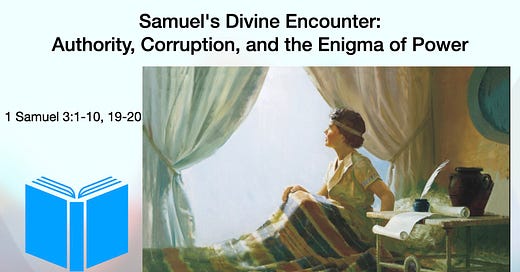Samuel's Divine Encounter: Authority, Corruption, and the Enigma of Power
1 Samuel 3:1-10, 19-20 - Wednesday, 1st in Ordinary Time, Jan 10, 2024
Today's passage from the Book of Samuel narrates the encounter between the young Samuel and the divine. The narrative highlights the rarity of divine communication during those times (1 Samuel 3:1), setting the stage for Samuel's exceptional experience. However, the liturgical reading omits the specific message God conveyed to Samuel (1 Sam 3:11-18), on which I would like to focus our attention.
An avid reader of the Bible easily distinguish three types of authority: the royal, the priestly, and the prophetic authority. The royal and priestly authority usually support each other as evident in the Book of Amos (see 7:10-13). But there are also examples when they clash with each other like in the story of Judean king Uzziah who usurped the priestly authority by trying "to burn incense on the altar of incense" (2 Chron. 26:16). The priestly and royal authority were considered hereditary but the authority of the prophets was coming directly from the Lord and it could not be passed to their children.
At the beginning of the Book of Samuel, we encounter an ageing priest whose sons defiled their priestly responsibilities, becoming symbols of corrupt misuse of power (1 Sam 2:12). Despite Eli's awareness of their transgressions, he failed to intervene, leading to a divine prophecy foretelling the downfall of his lineage and the emergence of a faithful priest appointed by God (1 Sam 2:35). In Christian interpretation, this could signify Jesus Christ, depicted as the High Priest in the order of Melchizedek in Hebrews.
The message that the young Samuel received that night from the Lord in the temple was about the impending doom of the house of Eli. The prophecy states that the house of Eli's iniquity cannot be atoned for by sacrifice or offering (1 Sam 3:14) which would culminate in a profound statement that "the blood of bulls and goats" can't take away sins (Hebrews 10:4). Samuel, overwhelmed by the gravity of the message, hesitates to relay it to Eli, only doing so at the old priest's insistence. Eli, in resignation to his fate, accepts God's will, acknowledging, "He is the Lord. Let him do what seems good to Him" (1 Sam 3:18).
As Samuel assumed roles of authority — a tribal ruler and a prophet — he was "trustworthy as a prophet of the Lord" (1 Sam 3:20). But, then as the story proceeds we are told that he appointed his two sons as judges who were as corrupted as the sons of Eli: "They took bribes and perverted justice" (1 Sam 8:3). In the end his authority is rejected by people's demand for a king.
This narrative echoes the timeless adage, "power corrupts, and absolute power corrupts absolutely." It reflects the transformation individuals undergo when vested with authority, often succumbing to its negative influences despite noble intentions. However, amidst this pattern, one figure stands apart: Jesus of Nazareth. His immunity to the corrupting forces of power remains a profound mystery, affirming His divine nature and unique ability to navigate authority without succumbing to its pitfalls.
Understanding why Jesus succeeded where others failed remains an enigma—a testament to His exceptional divinity, serving as an enduring reminder of His unparalleled influence and moral purity.




